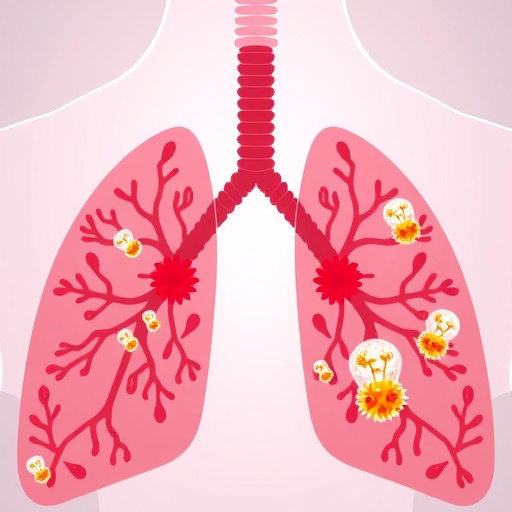Emerging research from a leading group of scientists has shed new light on the complex interplay between systemic inflammation and the progression of non-small cell lung cancer (NSCLC) harboring mutations in the epidermal growth factor receptor (EGFR). This breakthrough study elucidates how inflammatory signaling pathways, particularly those involving STAT3, may underpin the aggressive behavior of EGFR-mutant lung tumors, presenting potential new avenues for diagnosis and targeted therapy.
NSCLC remains one of the deadliest forms of cancer worldwide, with an especially high prevalence of EGFR mutations among Asian populations. These mutations, notably exon 19 deletions and the L858R point mutation, drive oncogenesis by constitutively activating pathways that promote tumor growth and survival. While the genetic underpinnings of EGFR-mutant NSCLC have been well documented, the role of the tumor microenvironment and systemic inflammation in modulating tumor dynamics has remained less clear—until now.
By analyzing clinical samples from 140 NSCLC patients spanning from 2016 to 2023, researchers sourced from the Ramathibodi tumor biobank have conducted one of the most detailed assessments of inflammatory markers both within tumor tissues and peripheral blood. The team employed advanced molecular techniques including real-time polymerase chain reaction (rt-PCR) for mutation detection in cancerous tissue, digital PCR in adjacent normal tissue, enzyme-linked immunosorbent assay (ELISA) to quantify protein signaling pathways, and flow cytometry for systemic cytokine profiling.
The study revealed a striking disparity in EGFR mutation prevalence: 58% of cancerous tissues bore the mutations, whereas only 5% were found within normal tissue from the same patients. This underlines the clonal expansion of EGFR-mutant cells within tumors and suggests a possible mechanism where normal tissue maintains genetic integrity despite a surrounding mutated environment. Of particular interest was the elevated expression of NF-kB and STAT3 proteins within cancerous tissues compared to normal counterparts, with these factors serving as central mediators of inflammatory responses linked to tumor progression.
STAT3, a signal transducer and activator of transcription, emerged as a pivotal marker, being significantly upregulated in EGFR-mutant tumors relative to wild-type counterparts. Patients exhibiting EGFR mutations showed median optical density measures for STAT3 markedly higher than those without mutations, reinforcing the hypothesis that STAT3-driven inflammatory signaling fosters the oncogenic phenotype. Additionally, inflammatory cytokines such as tumor necrosis factor-alpha (TNF-α) and interleukin-10 (IL-10) were elevated in tumor cells with EGFR mutations, indicating a tumor-promoting inflammatory milieu.
Notably, while circulating cytokine levels did not statistically differ between EGFR-mutant and wild-type patients, the intracellular signaling profiles in tumor cells highlighted the integral role of inflammation at the tumor site rather than systemic circulation. Multivariable analyses further underscored the unique association between elevated STAT3 in cancer cells and non-smoker status with the presence of EGFR mutations, reflecting epidemiological trends where non-smokers with NSCLC frequently harbor these mutations.
These findings add a crucial layer to the understanding of NSCLC pathophysiology, suggesting that inflammatory pathways are not just bystanders but active participants in the genesis and maintenance of EGFR-mutant lung cancers. The activation of STAT3 may orchestrate a pro-tumorigenic environment, facilitating cancer cell proliferation, immune evasion, and resistance to apoptosis. These insights open up possibilities for therapeutic intervention targeting STAT3 and related inflammatory mediators, which may complement existing EGFR-targeted therapies and overcome resistance mechanisms.
The study also alludes to environmental factors such as PM2.5—fine particulate matter that triggers cytokine release—as potential contributors to EGFR-mutant clone expansion, emphasizing the intricate relationship between environmental exposures, inflammation, and genetic mutations in lung carcinogenesis. This underscores the importance of considering both internal and external factors in lung cancer prevention and management.
While the research offers compelling evidence on the role of systemic and local inflammation in EGFR-mutant NSCLC, the authors emphasize the pilot nature of their study and advocate for larger, prospective cohorts to validate these promising biomarkers. Further, dissecting the crosstalk between different inflammatory pathways and their influence on tumor heterogeneity remains a fertile ground for future exploration.
In summary, this groundbreaking work highlights STAT3 as a potentially predictive biomarker for inflammation-driven EGFR-mutant NSCLC, advocating for a paradigm shift that integrates inflammatory signaling profiling into routine clinical assessment. Such advancements could pave the way for precision medicine approaches that tailor immunomodulatory and targeted therapies based on individual inflammatory signatures.
As lung cancer continues to pose a major global health burden, understanding the molecular symphony where cancer genetics and inflammation converge brings hope for improved prognostication, personalized treatments, and ultimately, better patient outcomes. This study symbolizes a significant leap forward in unraveling the complex biology of EGFR-mutant NSCLC and stimulates exciting questions about the role of inflammation in cancer evolution.
The researchers’ contribution marks a critical step toward integrating immunology and oncology, urging the scientific community to delve deeper into how manipulating inflammatory signaling could revolutionize lung cancer therapy. The ultimate goal remains to translate these molecular insights into clinical strategies that extend survival and enhance quality of life for patients with this formidable disease.
Subject of Research: The correlation between systemic inflammatory markers and EGFR-mutant non-small cell lung cancer (NSCLC).
Article Title: The impact of systemic inflammatory markers on EGFR-mutant non-small cell lung cancer.
Article References:
Wangsubtawee, S., Thamrongjirapat, T., Trachu, N. et al. The impact of systemic inflammatory markers on EGFR-mutant non-small cell lung cancer. BMC Cancer 25, 1510 (2025). https://doi.org/10.1186/s12885-025-14915-1
Image Credits: Scienmag.com
DOI: https://doi.org/10.1186/s12885-025-14915-1
Keywords: EGFR-mutant NSCLC, systemic inflammation, STAT3, NF-kB, cytokines, tumor microenvironment, molecular biomarkers, lung cancer, personalized therapy, inflammatory signaling pathways.
Tags: advanced molecular techniques in oncologycancer prevalence in Asian populationsclinical assessment of lung cancerEGFR-mutant lung cancergenetic mutations in lung cancerinflammatory markers in NSCLCnon-small cell lung cancerSTAT3 signaling pathwaysystemic inflammation in cancertargeted therapy for lung cancertumor dynamics and inflammationtumor microenvironment in lung cancer





